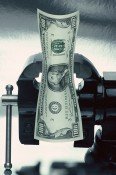Chewing some gristle on tax day? Here's a bit of news for you. Mississippi's two Republican senators in Washington, D.C., Thad Cochran and Roger Wicker, voted for another tax break for the über-wealthy this month, voting to raise the full exemption on inheritances from $7 million to $10 million per couple and to drop the top rate on fortunes over $10 million from 45 percent to 35 percent.
Cochran and Wicker voted "hell-yeah" on an April 2 amendment to Senate Concurrent Resolution 13 that expanded the amount the super-wealthy did not have to pay in estate taxes. Thanks to every Republican in the Senate and 10 rich-lovin' Democrats, Daddy Warbucks can now leave you a couple of mansions and a handful of yachts that you don't have to pay any taxes for if they stay under the $10 million mark. It was a very generous move considering a 2006 Responsible Wealth report estimating that only 20 Mississippi families qualified to take advantage of this particular tax loophole.
Wicker did not return calls, but Cochran argued that the exemption extended to Mississippi's multitiude of $10 million farms.
"As Americans are dealing with the impact of this economic downturn, now is the ideal time to provide a little relief to our small businesses and family farms that would be devastated by the impact of the death tax," Cochran said in a statement. "These small business owners are people who employ thousands of Mississippians, and we cannot afford to allow these jobs to be jeopardized by a death tax liability that would require them to liquidate their business assets."
Cochran's statement runs counter to a 2006 Responsible Wealth report estimating that only 20 Mississippi families qualified to take advantage of this particular tax loophole.
The nation's overall trend is toward poverty for the middle class. Weekly wages, after adjusting for inflation, were actually lower in 2007 than they were in 1979—the dreaded Carter years—according to the Economic Policy Institute's 2009 report "State of Working America."
It does not help that S&P 500 corporate CEO's made 30 times as much as the average worker in 1979, but in 2007 those same CEO incomes were an incredible 344 times higher, according to the 2008 report "Executive Excess 2008: How Average Taxpayers Subsidize Runaway Pay, 15th Annual CEO Compensation Survey," from the Institute for Policy Studies.
Progressive Tax Advocate Institute for America's Future reports a volley of reasons the middle class is feeling the squeeze. In 1980, for example, the top marginal tax bracket was 70 percent, but in 2009, it dropped to 35 percent. The $10 million maximum estate tax exemption referenced earlier was only $324,000 in 1980.
There's also the matter of Social Security taxes. Combined employer-employee payroll taxes rose from 6 percent in the 1960s to more than 15 percent in the new millennium. By the way, only income of less than $106,800 is subject to Social Security taxes; make more than that and you get to keep more.
The same report explains that the middle 60 percent of incomes (about 68.3 million households), brought home 44.1 percent of the nation's income in 2006, less than the 50.9 percent they brought home in 1980. In contrast, the top 1 percent (only 1,100,000 households) brought home 16.3 percent of the nation's income in 2006—a doubling of the 7.7 percent they took home in 1980.
And here's something else for you to chew on while you frantically try to finish your taxes and write out those hateful checks today: Working Americans pay tax rates of up to 35 percent on the income they earn from their jobs. But stock brokers like Warren Buffett, who earn their income through stock trading, treat their income as capital gains, subject to a tax rate of only 15 percent. This means Buffett pays taxes at a lower rate than his receptionist, according to Institute for America's Future co-director Robert Borosage.
Borosage said policymakers like Cochran and Wicker have been working for lavish tax breaks on the very wealthy since the 1990s.
"The size and number of loopholes and tax breaks available to the richest 10 percent of Americans is a scandal," Borosage said in a press release. "It's inconceivable to most people that billionaire hedge fund managers pay taxes at a lower rate than their receptionists. But this is increasingly where we find ourselves."
So as you zip off to your tea-bag party this week, make note of how many millionaires are standing beside you in the crowd, if any.
(Updated 4/17/2009 to include comments from Sen. Cochran.)



Comments
Use the comment form below to begin a discussion about this content.